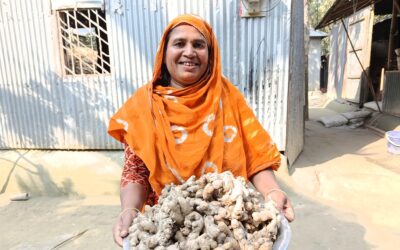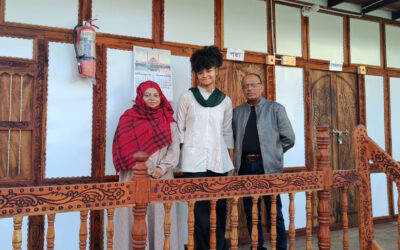Friendship’s health workers are working hard to change the prevalent culture of giving birth at home
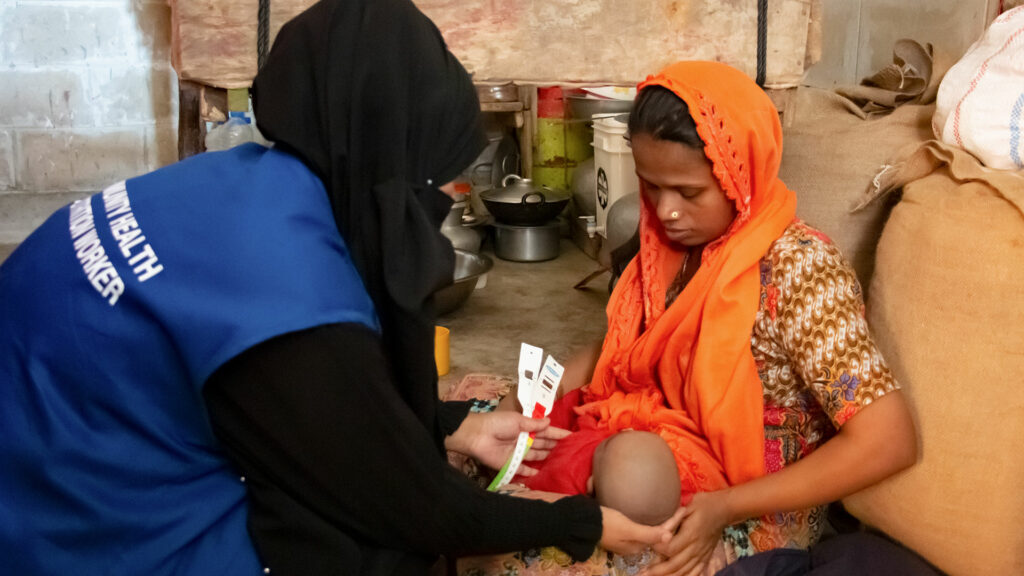
by Tahmeed Chaudhury
September 21, 2022
On August 16, Friendship’s health team at Bhasan char delivered its 100th child born via Normal Vaginal Delivery (NVD) at its Primary Healthcare Centre (PHC). Furthermore, 100% of childbirths in Friendship’s cluster areas on the island have been hospital births. This is a complete turnaround from the prevalent practice in Rohingya communities of giving birth at home. Bhasan Char, developed to accommodate around 100,000 Rohingya refugees, only started taking transfers from the camps in Ukhiya in December 2020.
Ayesha Akhter, 25, a Friendship community health and nutrition volunteer and a member of the Rohingya community, believes it is difficult to explain the benefits of hospital births to Rohingya refugees largely because of superstitious beliefs and a traditional mindset. “There has been a case or two where a child or a mother passed away despite giving birth at a hospital, which lead to them believing hospitals are cursed. Moreover, husbands and in-laws are often stubborn about giving birth at home. So, we have been trying to highlight the benefits, such as instant treatment in case of complications such as excessive vaginal bleeding.”
Friendship, with support from United Nations High Commission for Refugees (UNHCR), built the 12-bed PHC earlier this year, in addition to running three units at a 20-bed government hospital. Along with childbirth, the PHC offers general consultation, paediatric consultation, ante- and post-natal care, family planning services, sexual and reproductive health services, mental health and psycho-social consultations, vaccinations, in-patient services, etc. It is also equipped with a pathology lab, a dispensary, a pre- and a post-operative ward among others. The PHC employs four doctors, four nurses, 38 volunteers and several support staff.
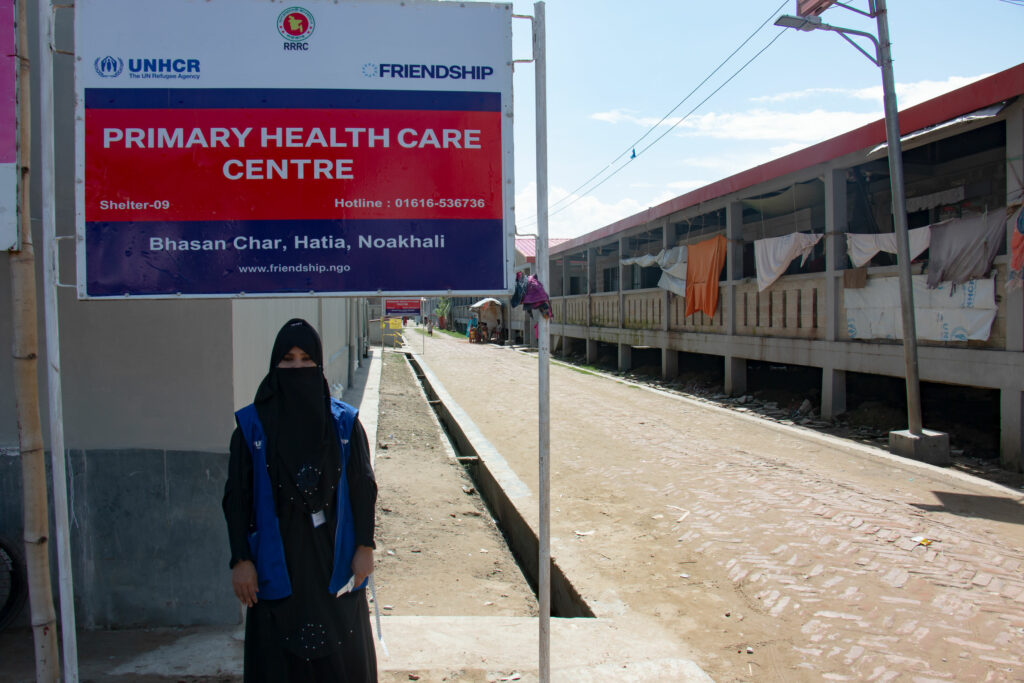
While doctors are instrumental in delivering quality medical care, other health workers play a vital role in bridging the gap between the service providers and the communities. They are typically volunteers selected from within the communities who are able to efficiently communicate with Rohingya people, understand their needs and address potential cases of medical emergencies. They go door-to-door to do health checks, mock-screen children, routinely follow up on patients, conduct group sessions etc. They play an integral role in identifying pregnant women, referring them to hospitals, following up with them from time to time, bringing them to hospitals before childbirth and providing antenatal and postnatal care.
They also try to raise awareness against issues such as child marriage and the health risks associated with teen pregnancy, in an attempt to discourage taking multiple children and to induce a change in mindset.
Ayesha has been working as a health volunteer ever since some of the Rohingya refugees moved to Bhasan char. “I especially try to communicate with pregnant women and follow up with them from time-to-time to refer them for ante- and post-natal care,” said Ayesha.
Visiting a woman who had given birth to a healthy male child only five days ago at the PHC through normal delivery, Ayesha asked about her health and her baby’s health, wanting to know if the baby’s food intake, bowel movements and other parameters were consistent. She left once she was satisfied that the mother and child were doing well and asked the mother, Sanwara Begum to contact her in case of emergencies.
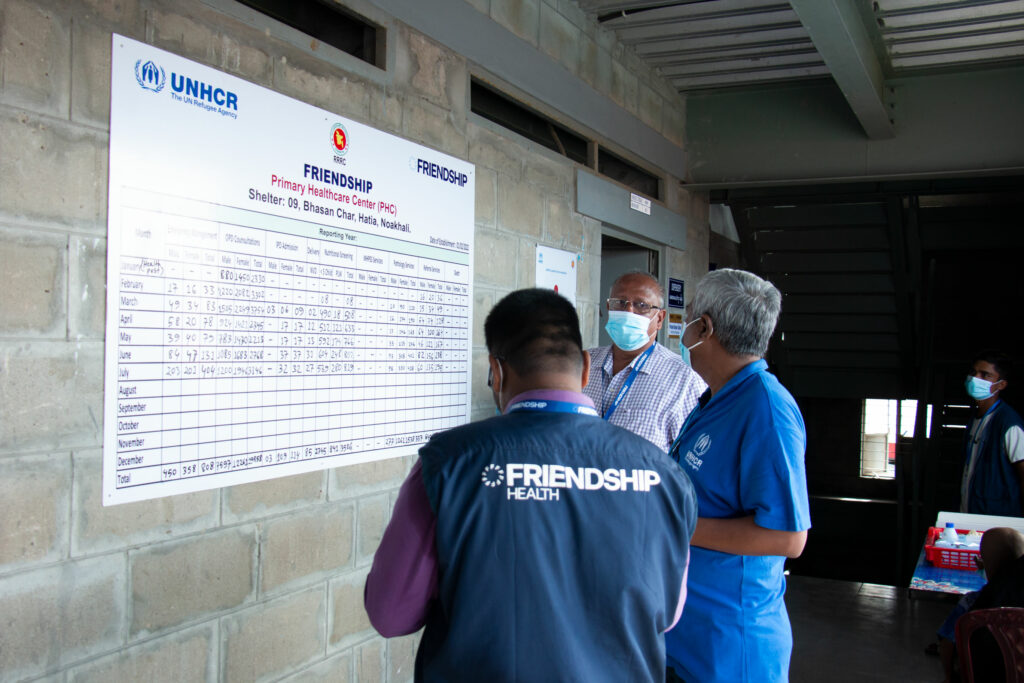
Sanwara previously gave birth to two daughters at home with the help of a midwife. This was the first time she chose hospital birth. When asked why, she said, “I decided to go to the hospital since I didn’t have much help around this time. I felt more comfortable post-birth this time compared to the last couple of times I gave birth. Doctors and nurses were constantly taking care of me and kept me under observation for post-birth complications. I will definitely recommend hospital births to my neighbours and relatives.”
Dr. Rafi Abul Hasnath Siddique, deputy director of Friendship’s health sector, feels it is important to have integrated health services under one roof to boost confidence among the Rohingya communities and help promote safe, institutional deliveries. “Institutional deliveries help reduce maternal and neonatal complications and aid in counselling people on family planning as well. This is an important aspect we are focusing on right now.”
Ayesha feels the efforts of Friendship and other humanitarian organisations are slowly inducing a change in mindset. “The people are now more responsive to our suggestions. Patients often contact us themselves to seek help and hospitalisation.”
So far, the PHC has overseen 123 normal childbirths since its inception. Furthermore, it is worth mentioning that Friendship’s primary healthcare centre in camp 20 of the Ukhia Refugee camp has also celebrated its 100th child birth on September 18, 2022.
As more people are drawn towards institutional delivery and are proactively attending family planning sessions, Dr. Rafi, Ayesha and others are hopeful that Rohingya people will give serious consideration to restricting the number of children they give birth to, which at present averages four per household.


